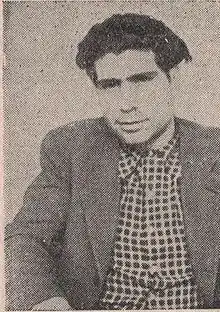Marià Rodríguez i Vázquez
Marià Rodríguez i Vázquez (1909 - 18 June 1939) was a Catalan anarcho-syndicalist leader, popularly known as Marianet.[1]
Marià Rodríguez i Vázquez | |
|---|---|
 | |
| General Secretary of the CNT | |
| In office 1936–1939 | |
| Preceded by | Horacio Martínez Prieto |
| Succeeded by | Esteve Pallarols i Xirgu |
| Personal details | |
| Born | 1909 Barcelona, Catalonia |
| Died | 18 June 1939 (aged 29–30) La Ferté-sous-Jouarre, France |
| Citizenship | Spanish |
| Nationality | Catalan |
| Political party | CNT |
| Signature |  |
Biography
He was born in Barcelona in 1909.[2] He was ethnically Romani[3] and was orphaned as a child, which is why he spent part of his childhood in the Duran Asylum, from where he often fled. As a young man he engaged in crime and was imprisoned, where he made contact with libertarian prisoners and rationalist teachers he adopted anarcho-syndicalism and abandoned crime.[4]
He was regional secretary of the Catalan National Confederation of Labor (Catalan: Confederació Nacional del Treball, CNT) between November 1936 and June 1939.[5] After the resignation of Horacio Martínez Prieto, he also assumed the position of national secretary of the CNT. He played a decisive role in the evolution of anarcho-syndicalism and political and social life during the course of the Spanish Civil War. Later in the conflict, he advocated active collaboration with the republican government of Juan Negrín,[5] which led to accusations of treason and revisionism by some CNT sectors.[3]
Towards the end of the war, before the Catalonia Offensive, he was forced to leave Spain and went into exile in France.[3] He settled in Paris,[6] from where he tried to organize the CNT in exile. He also participated in the creation of the Spanish Refugee Evacuation Service (SERE) along with other politicians from the republican faction.[7] On 8 February 1939 he participated together with other anarchist leaders in a meeting held in the French capital, which he attended as head of the National Committee of the CNT and proposed a prolonged republican resistance, in order to "make themselves feared".
He drowned in the river Marne, in La Ferté-sous-Jouarre, on 18 June 1939.[8] His companion, Conchita Davila, went into exile in Mexico where she died on 30 August 1974.[9]
References
- Montseny, Federica (July 1959). "Biografía de Mariano R. Vázquez "Marianet"". Cénit: Sociología, ciencia y literatura (in Spanish). No. 103. Portal Libertario OACA. Retrieved 27 August 2017.
- Paz 2001, p. 50.
- Romero Salvadó 2013, p. 285.
- Díez, Xavier. "Venjança de classe. Causes profundes de la violència revolucionària a Catalunya el 1936" (PDF). p. 25. Archived from the original (PDF) on 2016-01-13. Retrieved 2020-12-26.
- Tavera i Garcia, Susanna; Ucelay Da Cal, Enric (October 1996). "El discurs de la disciplina Jacinto Toryho i Solidaridad Obrera (1936-1938)". Treballs de Comunicació (in Catalan). No. 7. pp. 145–164. ISSN 2014-0029. Retrieved 27 August 2017.
- Romero 1976, p. 124.
- Rafaneau-Boj 1995, p. 155.
- Martín Nieto 2012, p. 1.
- Gómez, Demetrio. "Mariano Rodriguez Vazquez, "Marianet", gitano y dirigente libertario durante la Guerra Civil". Kaos en la Red. Retrieved 27 August 2017.
Bibliography
- Martín Nieto, Isaac (2012). Alejandra Ibarra Aguirregabiria (ed.). "Gitano, ignorante y traidor. Mariano R. Vázquez en la Literatura Histórica Militante Libertaria" (PDF). No es país para jóvenes. ISBN 978-849860-636-2.
- Paz, Abel (2001). CNT 1939-1951. El Anarquismo contra el Estado franquista. Fundación de Estudios Libertarios «Anselmo Lorenzo».
- Rafaneau-Boj, Marie-Claude (1995). Los campos de concentración de los refugiados españoles en Francia, 1939-1945. Omega.
- Romero, Luis (1976). El Final de la guerra. Barcelona: Ed. Ariel.
- Romero Salvadó, Francisco J. (2013). Historical Dictionary of the Spanish Civil War. Scarecrow Press. ISBN 978-0-8108-8009-2.